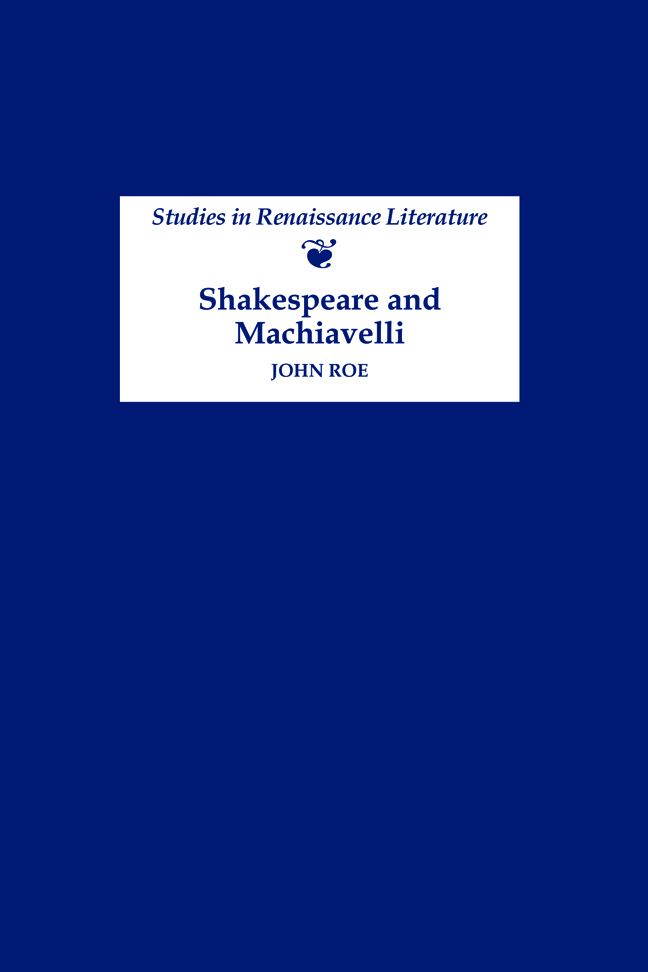Book contents
- Frontmatter
- Contents
- Acknowledgments
- Text and Abbreviations
- Preface
- Dedication
- 1 Shakespeare and Machiavelli
- 2 Richard II and the Bullingbrook Affair: Subtle Rhetoric and a ‘Silent King'
- 3 Henry V: The Prince and Cruelty
- 4 King John: Cruelty and the Action of Conscience
- 5 Julius Caesar: Conscience and Conspiracy
- 6 Antony and Cleopatra: Magnanimity and a Machiavellian Erotics
- Bibliography
- Index
2 - Richard II and the Bullingbrook Affair: Subtle Rhetoric and a ‘Silent King'
Published online by Cambridge University Press: 15 February 2024
- Frontmatter
- Contents
- Acknowledgments
- Text and Abbreviations
- Preface
- Dedication
- 1 Shakespeare and Machiavelli
- 2 Richard II and the Bullingbrook Affair: Subtle Rhetoric and a ‘Silent King'
- 3 Henry V: The Prince and Cruelty
- 4 King John: Cruelty and the Action of Conscience
- 5 Julius Caesar: Conscience and Conspiracy
- 6 Antony and Cleopatra: Magnanimity and a Machiavellian Erotics
- Bibliography
- Index
Summary
The death of this duke gave occasion of increasing more hatred in the people of this realme toward the king, for he seized into his hands all the goods that belonged to him, and also received all the rents and revenues of his lands which ought to have descended unto the duke of Hereford by lawfull inheritance … whereby it was evident that the king meant his utter undooing.
(Holinshed)li uomini sdimenticano più presto la morte del padre che la perdita del patrimonio.
(Il Principe; B 54-5; ‘Men are quicker to forget the death of a father than the loss of a patrimony', A 46.)
And that's the wavering commons, for their love
Lies in their purses, and whoso empties them
By so much fills their hearts with deadly hate.
R2 2.2.127-9THE Second Tetralogy, or Henriad, manifests Machiavellism in a variety of ways. The plays in this sequence of histories present no single figure who acts out the kind of villainy that popularly distinguishes Richard III. Instead, attention switches to what might be called the Machiavellian dynamic. From the crisis precipitated by Richard II's peremptory actions in the first of these plays, this tetralogy concerns itself with the operations of power, its shifts and circumstances. As the various plots unravel and give way to one another, the dramatist observes the interplay of human ambition and the limiting force of circumstances, while, in accordance with the historical accounts he has consulted, he keeps always in mind the idea of a providential outcome.
Beginning with Richard II, Shakespeare's way of applying precepts made familiar by Machiavelli undergoes a subtle change from what we have seen in Richard III. The action of Richard II turns on the conflict between two figures who, in dramatic terms at least, are equal to one another. Neither of them resembles Richard III with his crafty, calculated asides inviting the audience to share his confidence. Such soliloquies as the play gives us come deep in its latter half when a disconsolate, defeated Richard communes with himself in our hearing. These speeches convey nothing of a mind going through its machinations, as in Richard III, for the straightforward reason that Richard, the prisoner of Pomfret, is without power and without the ambition to power.
- Type
- Chapter
- Information
- Shakespeare and Machiavelli , pp. 30 - 62Publisher: Boydell & BrewerPrint publication year: 2002



